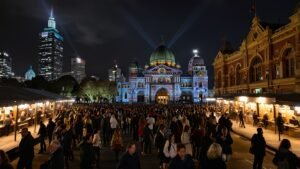
The protests in October were warned against by Prime Minister Anthony Albanese, but a pro-Palestinian rally went ahead in Melbourne today. Thousands of people attended the event in the city centre, which marked the one-year anniversary of the outbreak of the Israel-Hamas conflict, in a tense atmosphere that saw police deploying a heavy presence in order to keep the public safe.
The rally’s organisers, who had been weeks plotting the event, refused to back down in the face of government pressure. It said they were in Gaza in response to supporting Palestinians in ways that were necessary to show solidarity with them and to say no to the ongoing conflict in the Gaza. A last minute challenge to the rally failed in court before the decision to proceed with the rally was made.
Earlier, Albanese said he had concerns about the timing and nature of the protest, urging organisers to rethink. However, we respect the right to peaceful protest, but we need to respect sensitivities to this date and the potential for the escalation of violence, Albanese said in a press conference yesterday. The government was worried the event could be incendiary, and his comments, made during an otherwise routine visit to DC, reflected those concerns.
The rally started peacefully at Victoria’s State Library where speakers addressed the crowd on different aspects of the Israeli-Palestinian conflict, despite the controversy. Palestinian flags and placards reading ‘End Gaza and West Bank occupation’ were carried by protesters. The chant of ‘Free Palestine’ and ‘End the siege’ repeated as the march made its way to Parliament House.
Crowd behaviour was also kept an eye on, and police lined the protest route as the event was carefully managed with a lot of police resources being deployed. Assistant Commissioner John Smith said the majority of protesters had been peaceful but there had been some isolated minor scuffles and verbal confrontations with counter protesters. “I want to make sure the safety of all Melbourne people who either are exercising their right to protest or are simply going about their day to day lives,” Smith said.
The debates over free speech and public safety have seemed to reignite again in Australia. But civil liberties groups have criticised that effort as setting a dangerous precedent for silencing political expression. But some community leaders have raised questions about whether such events risk adding fuel to social tensions and increase antisemitic feelings.
But Jewish community representatives were disappointed that the rally went ahead on such a sensitive date and felt it should never have been allowed to take place. It is deeply hurtful to many in our community who we are still grieving from the losses of last year’s attacks, we support the right to peaceful protest, but the holding of this rally on the 7th of October is deeply hurtful, Mr David Cohen, spokesperson for the Jewish Community Council of Victoria.
But the rally has wider civic ramifications in Melbourne. Public transport was disrupted along the march route and some businesses in the CBD said they saw less foot traffic because of the protest. Now, city officials are weighing the economic impact of the event when deciding what to do with the right to protest weighed against the interests of the broader community.
At the end of rally, the organisers saw the rally was a success because of the large number of people of people and the peaceful nature of the protest as an indication of strong community support for the Palestinian cause. Despite that, they admitted to the controversy around the event and said they would discuss it with those who disliked it.
Questions remain about how to navigate that complex intersection of global conflicts, local communities, democratic freedoms — and the aftereffects of a rally, Melbourne wallows in its aftermath. In the wake of today’s events, there are calls for more community interaction, as well as both more and broader cross-cultural dialogue designed to elevate tensions many of which came to bear today.
And now, with the protest over, what happens to other demonstrations, of even greater sensitivity on international issues, is now the next question for the federal and state governments to answer. In Australia, where the events in Melbourne may very well set the agenda on protest management and community relations for months to come as it contemplates its increasing place within a complex global landscape.



